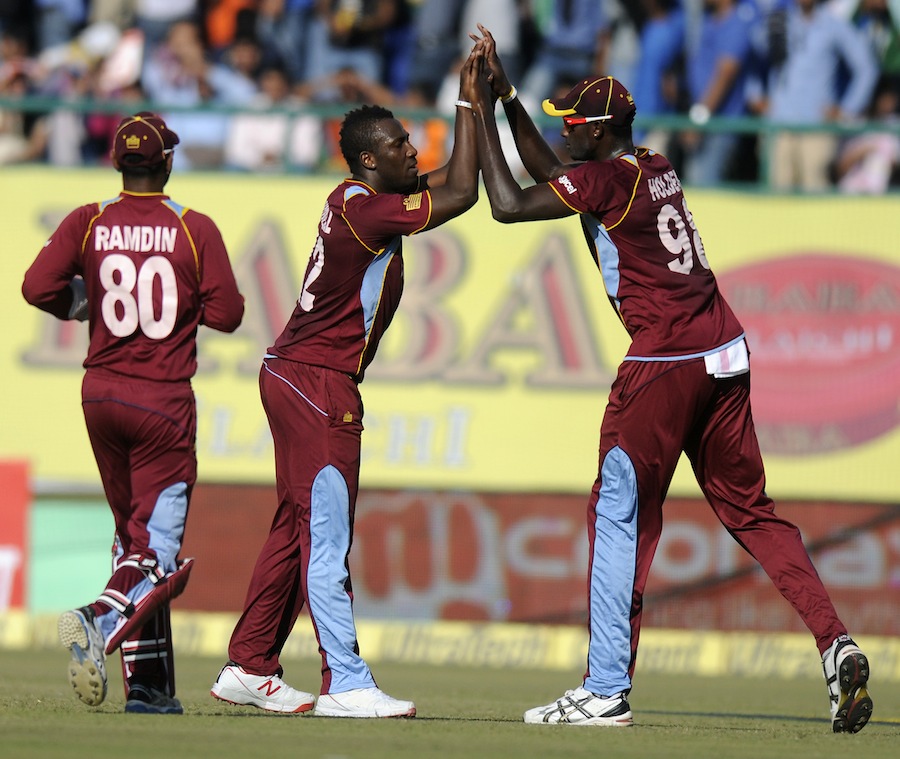
Michael Holding is among those who feel the West Indies players have been cast in the role of sinners in the latest saga © BCCI
Big hitter wanted. Must be comfortable handling money, schmoozing Australian media magnates, worshipping at the Church of Broadcasting on an hourly basis, maintaining an unholy trinity of power, changing course at the drop of a hat, staging events that lack context or go on too long, and treating the talent like worker ants (which of course they are). Imagination, a working set of principles and a capacity to think more than five minutes ahead nice but not essential. Cricketing experience would also be nice, but ex-professionals need not apply. Did we stress "no women" enough? All right then, NO WOMEN.
The "Positions Vacant" column at ICC Towers or BCCI HQ could never adopt that precise wording, of course. The sentiments, nonetheless, wouldn't be terribly different, not in essence. Perhaps the fondest and most self-deluding perception we cricket fanciers suffer from is the idea that, as a species, the game's administrators have the game at heart. Or anywhere remotely near it.
This is why a globally respected former player told me last week, after I'd urged him, for the good of the game, to put on his best suit and apply for his mandarin's licence, that he would just as soon buy a return flight to the sun, or even a lifetime's subscription to the Sun. This is also the fundamental reason why cricket in the Caribbean has just been dumped into what may well prove to be the deepest, muddiest, smelliest bogthis grand old game of ours has ever had the nose-holding, arm's-length displeasure to behold.
As Michael Holding related in his column for Wisden India, the roots of the duel between Dwayne Bravo et al and the West Indies Cricket Board lie in the latter's quest for revenge on the uppity West Indies Players' Association. And not over the shenanigans of Chris Gayle or Sunil Narine - or at least, not directly - but over the insistence that the board honour a pay rise to the players approved by its former CEO, Dr Ernest Hilaire.
To be fair, the CEO had been "conned" - as Holding put it - into sending the incriminating email by Dinanath Ramnarine, the former WIPA president and chief executive (indeed, Holding took a current WIPA official out for dinner and made no bones about his anger at such a shameless stunt). That, though, was scant consolation to Hilaire, or the WICB.
There can be little question, given its lamentable track record in player relations - a track record that has made the WIPA one of the most militant players' unions anywhere - that the WICB deserves public humiliation. And public humiliation can propel even the most intelligent and far-seeing fellows to the most asinine of reactions. Trouble is, when it comes to cricket officials - or, for that matter, officials of any sporting, showbiz or political creed - presumptions of intelligence and foresight may be unduly kind.
Holding, it should be added, has never been a rabid advocate of players' rights. That underlying ambivalence - towards the WICB as well as his on-field successors - has been easy to understand. To someone such as him, a Jamaican for whom playing for West Indies meant something more than representing a region, the ever-rising emphasis on financial reward can at times seem odious. When he was skittling all those England batsmen at The Oval in 1976, Holding will assure you, a win bonus or enhanced contract was an additional, minor incentive, not a cause. The revolution he was fighting, though, has been more or less won; now another needs winning.
That's why Holding has been unable to contain his fury, taking up cudgels on behalf of players who he feels (and not without extremely good reason) have been shat upon from a considerable height and cast, inevitably, as scapegoats. That the owner of the calmest, coolest, unshrillest voice in the menagerie we call the commentary box should feel compelled to raise it to such a pitch should not, cannot, be dismissed lightly.
That Bravo et al cannot even trust their own union rep, Wavell Hinds, ironically a long-time friend of Bravo's as well as a pal of Dave Cameron, the WICB president, emphasises how toxic things have got. Likewise Marlon Samuels' non-solidarity.
****
One of the under-appreciated benefits of the IPL is that it has empowered the players. Now, finally, the wealthy (and not undeserving) few have a shot at controlling their own destinies, free of club or board interference. This has also led down a bumpy road to a spooky place, a place where national teams, for so long the focus and pinnacle of attention, no longer call all the shots, where the highest levels of the game are merely the hors d'oeuvres, net practice for those whose appetites extend to all-you-can-eat feasts in Mumbai and Kolkata.
Nonetheless, amid all this frantic and often confusing relocation of the goalposts, Bravo and company were still willing to take a pay cut if it meant benefiting those labouring on the lower half of their greasy, treacherous pole. How many of us, in our own jobs, would do likewise? Granted, exceedingly few of us earn anything like as much as Bravo or Gayle (or even Jason Holder), but how many bankers or surgeons are queuing up to take a pay cut to help clerks or nurses? Generosity is generosity. For that, surely, these rebels warrant our admiration rather than opprobrium.
That the WICB appears so eager to paint a diametrically opposed picture testifies to its members' desperation to maintain control at any cost to credibility. Before the forceful Ramnarine resigned in 2012, the board refused point blank to deal with him. Garth Wattley summed up the board's approach to the WIPA as "a mixture of conciliation, intransigence, and more often of late, arrogance".
| | | | |
| |
| That Michael Holding, the owner of the calmest, coolest voice in the menagerie we call the commentary box should feel compelled to raise it to such a pitch should not be dismissed lightly |
| |
| | |
|
Once upon a time, at the risk of tooting my own horn, I was party to a similar collective effort to aid less fortunate colleagues. When Robert Maxwell suddenly closed the London Daily News in 1987, after the bouncing Czech had lured scores of journalists from safe jobs to launch the paper just five months earlier, those of us who had been on board from the start voted to take a 50% cut in our severance pay. We decided on this course in order to ensure that the latest appointees, who had left their previous publications but had yet to report for duty at the LDN (of whom there were a fair number), could be compensated. It didn't help them enormously but I like to think they appreciated the gesture. On the other hand, I was single and childless at the time; I'm not at all sure I would have backed such a vote 20 years later.
But let's not get distracted. The bottom line could not be clearer. In the centuries-old struggle between management and players, across all major professional sports, the workers, emboldened by free agency, agents and endorsements, are now asserting their rights as never before - and management doesn't like it one eensy-weensy bit. Particularly not when it breeds season-shortening strikes (witness Major League Baseball in the mid-1990s), let alone season-nullifying strikes (witness the National Hockey League in 2004-05). The abrupt cessation of activities in an ODI series, barely a month after FICA, the international brotherhood, welcomed the signing of a collective bargaining agreement between the WICB and the WIPA, is merely another small landmark on the long, steep, rocky climb to respect.
Nothing proclaims the extent to which the tables have turned over the past half-century than a remarkable statistic from the winter of 2012-13: for the first time since Major League Baseball owners consented to salary and contract arbitration in 1974, not one of the 133 players took his claim as far as a hearing, the upshot of the clubs' increasing willingness to sign younger players to multi-year deals, affording even non-stars a degree of security. Unfortunately West Indies cricket is neither wallowing in record attendances nor benefitting from equitable revenue-sharing.
The funny thing about all this - as in funny-peculiar rather than funny-ha-ha - is that this latest downing of tools should happen in India, where resistance to players' unions, among the players themselves, has been fiercest. For all the vicissitudes of the BCCI, the fact that Sachin, Rahul and Anil never felt much, if any need, to form one says a great deal about their contracts, but must also say something at least faintly complimentary about N Srinivasan and his posse.
By the same token, the reality is unavoidable: without Indian support FICA will remain toothless. Fearless as the WIPA is, the day that MS Dhoni and/or Virat Kohli declare public solidarity with their brothers in charms is the day the WICB, Sri Lanka Cricket and their ilk start pondering the wisdom of their conniving and bullying. Only then will professional cricketers truly feel that the pendulum has swung as far as it needs to swing.
It takes two to tango, but it takes a lot more to stop a rot.





